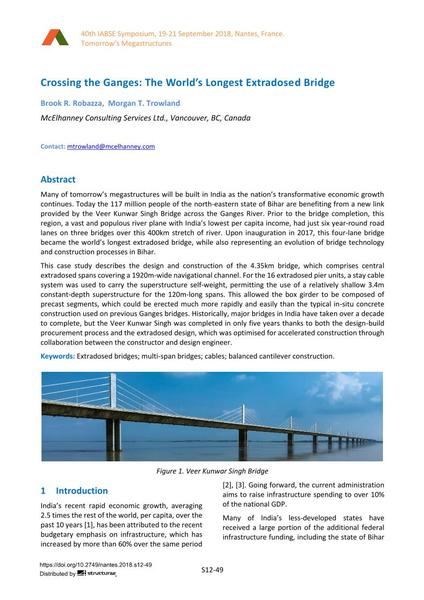Crossing the Ganges: The World’s Longest Extradosed Bridge

|
|
|||||||||||
Bibliografische Angaben
| Autor(en): |
Brook R. Robazza
(McElhanney Consulting Services Ltd., Vancouver, BC, Canada)
Morgan T. Trowland (McElhanney Consulting Services Ltd., Vancouver, BC, Canada) |
||||
|---|---|---|---|---|---|
| Medium: | Tagungsbeitrag | ||||
| Sprache(n): | Englisch | ||||
| Tagung: | IABSE Symposium: Tomorrow’s Megastructures, Nantes, France, 19-21 September 2018 | ||||
| Veröffentlicht in: | IABSE Symposium Nantes 2018 | ||||
|
|||||
| Seite(n): | S12-49 | ||||
| Anzahl der Seiten (im PDF): | 8 | ||||
| DOI: | 10.2749/nantes.2018.s12-49 | ||||
| Abstrakt: |
Many of tomorrow’s megastructures will be built in India as the nation’s transformative economic growth continues. Today the 117 million people of the north-eastern state of Bihar are benefiting from a new link provided by the Veer Kunwar Singh Bridge across the Ganges River. Prior to the bridge completion, this region, a vast and populous river plane with India’s lowest per capita income, had just six year-round road lanes on three bridges over this 400km stretch of river. Upon inauguration in 2017, this four-lane bridge became the world’s longest extradosed bridge, while also representing an evolution of bridge technology and construction processes in Bihar. This case study describes the design and construction of the 4.35km bridge, which comprises central extradosed spans covering a 1920m-wide navigational channel. For the 16 extradosed pier units, a stay cable system was used to carry the superstructure self-weight, permitting the use of a relatively shallow 3.4m constant-depth superstructure for the 120m-long spans. This allowed the box girder to be composed of precast segments, which could be erected much more rapidly and easily than the typical in-situ concrete construction used on previous Ganges bridges. Historically, major bridges in India have taken over a decade to complete, but the Veer Kunwar Singh was completed in only five years thanks to both the design-build procurement process and the extradosed design, which was optimised for accelerated construction through collaboration between the constructor and design engineer. |
||||
| Stichwörter: |
Extradosed-Brücken Seile
|
||||

